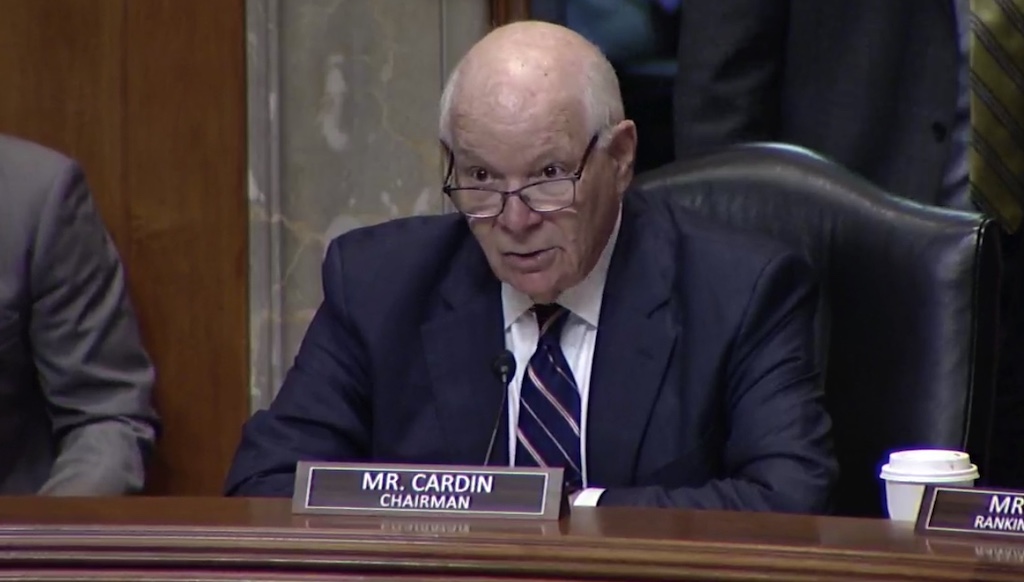WASHINGTON – Sen. Ben Cardin, D-Maryland, the newly-appointed chairman of the Senate Foreign Relations Committee, has announced plans to block future U.S. military aid and arms sales to Egypt unless that country shows “concrete, meaningful, and sustainable steps” to improve its human rights record.
“It is imperative that we continue to hold the government of Egypt, and all governments, accountable for their human rights violations,” Cardin said in a statement.
Cardin’s decision marks a significant shift in U.S. policy towards Egypt, a long-standing ally in the Middle East. The senator plans to block $235 million in foreign military assistance that the Biden administration approved on September 14.
The move starkly contrasts with the actions of Cardin’s predecessor, Sen. Bob Menendez, D-New Jersey, who was indicted Sept. 22 for allegedly accepting bribes to influence U.S. policy in favor of the Egyptian government.
Cardin’s action is colliding with the Biden administration’s efforts to foster closer ties with Egypt.
State Department spokesman Vedant Patel said in a press briefing Wednesday that the United States aims to advance a strategic partnership with Egypt that ensures regional security and fosters significant progress on human rights issues.
Patel added that Secretary of State Antony Blinken believes waiving certain conditions for Egypt’s foreign military financing in fiscal 2022 aligned with U.S. national security interests.
A total of $1.215 billion in military aid has been allocated for Egypt and discussions with Congress and Egyptian partners are ongoing, Patel said.
“I was very open in my disappointment in the administration using the waiver on the use of funds, but I want to have a chance to meet with the administration,” Cardin told Politico.
Before assuming his current role, Cardin had criticized the Biden administration for overriding a human rights prohibition on $320 million of military aid to Egypt.
He was among a group of senators, including independent Bernie Sanders of Vermont and Chris Murphy of Connecticut, Richard Blumenthal of Connecticut, Sherrod Brown of Ohio, Dick Durbin of Illinois, Jeff Merkley of Oregon, Elizabeth Warren of Massachusetts, Tim Kaine of Virginia, Tom Carper of Delaware that urged the Biden administration to withhold the $320 million from Egypt.
The senators argued that the Egyptian government had failed to make “meaningful progress in addressing human rights concerns” and that withholding the funds was “required by law” in the fiscal 2022 spending bill.
In a July 28 letter to Blinken, the senators charged that the Egyptian government had “not only failed to investigate allegations of human rights abuses, it has also continued to commit ‘significant human rights’ violations such as extrajudicial killings, enforced disappearance, torture and life-threatening prison conditions, and severe restrictions on freedoms of expression, assembly, and association, as documented in the State Department’s latest human rights report.”
According to Amnesty International, Egyptian authorities severely restrict civil liberties, including freedom of expression and assembly.
In the lead-up to the United Nations Climate Change Conference (COP27) in November 2022, 895 political prisoners were released but nearly triple that number were arrested, according to Amnesty International.
“Sexual and gender-based violence remained prevalent, amid the authorities’ failure to adequately prevent and punish it,” Amnesty International said. Workers’ rights and religious freedoms are also suppressed, and refugees are mistreated.
The decision to freeze aid could have geopolitical implications.
As a result of the aid hold, “the anti-America(n) camp will be empowered domestically,” Haisam Hassanein, an adjunct fellow at the Foundation for Defense of Democracies, told Jewish Insider.
He predicted that the group would publicly push for Egypt to strengthen its relations with Russia and China.
“This could force President (Abdel Fattah El-) Sisi in his current election campaign to release some (inflammatory) statements to save face in front of his constituents,” Hassanein said.
On Wednesday, Cardin also announced plans to halt security assistance to Azerbaijan due to its “brutal campaign” in the Nagorno-Karabakh region, effectively erasing its Armenian population.
Cardin emphasized the need to document war crimes and atrocities and to support efforts to repatriate prisoners of war.
He called for increased humanitarian support for ethnic Armenians who have left Nagorno-Karabakh and for the United States to continue supporting democratic reforms in Armenia.

